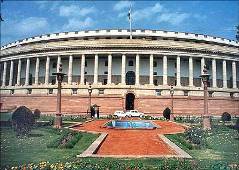 Amid concerns of overheating of the economy in the backdrop of high inflation and double digit industrial growth, leading chamber Confederation of Indian Industry has said the industry should be provided incentives in the next Budget.
Amid concerns of overheating of the economy in the backdrop of high inflation and double digit industrial growth, leading chamber Confederation of Indian Industry has said the industry should be provided incentives in the next Budget."CII feels that while formulating Budget 2011-12 . . . revenue raising measures need to be balanced against some incentives to industry," it said in a pre-budget memorandum to the Revenue Department.
In its mid-year analysis presented in Parliament earlier this week, the Finance Ministry had said that there were concerns about overheating of the economy in the midst surge in capital flows.
The Reserve Bank of India has already ended its accommodative credit policy and the Finance Ministry had started withdrawing the stimulus package given to the industry after 2008-09 slowdown.
These measures have been taken in view of inflation remaining much above the comfort level of about 5 per cent.
Food inflation again moved up to 8.69 per cent for the week ended November 27, after a decline for seven consecutive weeks, while overall inflation was 8.58 per cent in October.
However, the economy has shown a robust trend posting 8.9 per cent growth in the first half of the current fiscal.
It would be further helped by industrial expansion which registered a growth of 10.8 per cent in October.
CII, on its part, wants widening of the tax net to include large part of the informal sector and said tax collection can be improved without increasing the rates.
In its memorandum to Revenue Secretary Sunil Mitra, the industry body pitched for expanding the base of services tax to include all services like railway fares and freights with only a small negative list.
"The Budget should also aim at facilitating convergence to the long-term objective of having a simplified and rational taxation system," it said.
CII also stressed on reducing the fiscal deficit to 4.8 per cent of gross domestic product in the next fiscal from the budgeted level of 5.5 per cent in the current year.
"CII feels that while formulating Budget 2011-12, it would be necessary to keep in mind that there are a number of serious areas of concern for the industry, which could pose a downside risk to GDP growth next year.
Liquidity in the banking system is tight and interest rates are moving up, which has started affecting capital formation adversely."
It suggested raising Rs 50,000 crore (Rs 500 billion) through disinvestment in 2011-12, and another Rs 50,000 crore through facilitating the settlement of funds locked up in disputes and litigations.
"Further, given that the existing general rate of excise duty of 10 per cent is at par with the proposed central goods and service tax rate, it is proposed to keep it unchanged," adding that the central sales tax rate should also be reduced from 2 per cent to nil in view of the further likely delay in implementation of GST.










